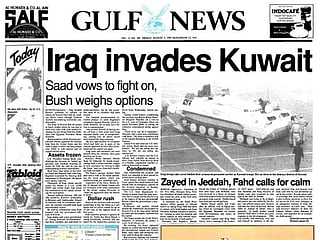Red Sea tanker ‘Beirut-like disaster waiting to go off’
Abandoned oil tanker a looming catastrophe off coast of Yemen’s vital port of Hodeidah

Abu Dhabi: A Yemeni source has sounded the alarm of a humanitarian and environmental catastrophe in the Red Sea in what could be a parallel disaster to Beirut’s deadly explosion
Houthi militia continue to refuse to allow maintenance of a dilapidated ship stranded about 60km north of Yemen’s port city of Hodeidah.
The source said leaving the FSO Safer tanker without maintenance and repair threatens the Hodeidah port and large parts of the Red Sea and international shipping.
Accoridng to the source, the situations is no less dangerous than the explosion of Beirut Port and the common factor is the Iran-aligned Hezbollah militia that controls Lebanon.
“Mohammad Ali Al Houthi, a member of the Iran-backed militia’s political council, has explicitly and overtly threatened to blow up FSO Safer tanker, which is currently carrying an estimated 1,400,000 barrels of crude oil and needs critical maintenance to mend cracks that have been allowing water to leak into the control room,” the source said.
The Houthis, a rebel group fighting the internationally recognised, US-backed government, seized the vessel from the government in 2015. No maintenance has been performed since, and despite repeated warnings of a looming disaster, the Iran-aligned rebels have obstructed attempts by the United Nations to send inspectors.
The Houthis have been fighting against the UN-recognised government of Abdrabbuh Mansur Hadi and the Arab Coalition since 2015 and currently control both the capital Sanaa and the strategic port city of Hodeidah, which is a key government target.
The ship is currently at risk of sinking or exploding, which would flood the sea with oil and have a devastating impact on the Red Sea coral reef, Yemeni islands and the livelihood of Yemeni fishermen.
For his part, the director general of the Hodeidah Oil Company, Eng. Anwar Al Amiri, said the tanker is used by the Houthis for more than two reasons. The firstis blackmailing the government and the entire international community> The second is a threat in the event of the army or resistance returning to enter Hodeidah. “This is their last card,” Al Amiri said.
The 1976 tanker, described as a “floating bomb” by the Atlantic Council in April, was left deserted after it was captured by the Iran-backed Houthi militia in March 2015.
Al Amiri said in the event of any bombing or major terrorist act carried out by the Iranian Houthi arm, the legitimacy government and the coalition will immediately be held responsible, and currently the Houthis falsly say on all their media channels that the legitimacy and the coalition are disrupting the maintenance of the vessel.
The Houthis have blocked several UN plans to inspect the ship to assess the scale of the damage.
The most recent incident was last month, when the Houthi militia blocked the maintenance of the aging oil tanker, according to Saudi Arabia’s embassy in the United States.
If the Houthis cannot use the ship as a tool for political pressure, they will try and gain from it financially, analysts said.
The crude oil is worth between $40 to $60 million and the Houthis want to take control,” the analyst told Al Arabiya. “Al Houthi militia want to resell it, but they cannot do so legally since it belongs to the government. Therefore, by complicating the situation, [the Houthis] put pressure on international parties in an attempt to get their hands on the oil,” an analyst said
Sign up for the Daily Briefing
Get the latest news and updates straight to your inbox









